Module2 (Book 4)
五年级英语上学期Module2Unit4故事原创逐字稿原创板书设计Unit4Grandparents

Book51 Unit4 Grandparents Where is Grandma?Good morning, dear judges. I’m Candidate No.1. My topic is Unit4 Where is Grandma? May I ..?Good morning, boys and girls. How are you today? Fine! Great! I am so glad to hear that! Do you often go out with your grandparents? Yes? What do you usually do outside? Boy? You usually have a picnic with your grandparents. How about you, girl? I usually climb the mountains with my grandparents. It’s very good for your health. Today, let’s read a story: Where is Grandma?Now, open your books and turn to Page 26. Listen and tell me: Who is this story about? What do they plan to do? Ready? Go. OK. Who is this story about? Mary, John, Grandma and Coco. What do Mary and John want to do with grandma? They want to go shopping with her.Now, boys, read Part 1 together. One, two, go!1. When do they want to go shopping? This Saturday. What time dothey want to meet? At 12:00.2. Where do they want to meet? At the bus stop.3. How can Grandma remember the time and the place? She writes them on the Calendar.Now, girls, please read Part 2. Go!1. When is it now? It’s Saturday and it’s 12:00 now.2. Where are Mary and John? They are at the bus stop.3. Is Grandma there? No, she isn’t.Well, now, let’s read Part 3 and Part 4 together.Grandma is cooking lunch in the Kitchen.Coco runs to the bus stop and takes Mary and John to Grandma’s house.Now, please think: John says Grandma is never late. But why is Grandma late today? OK, work in groups and discuss it. Finished? What’s your idea? Grandma forgets about it. Because she has a bad memory? Maybe. Any other ideas? Grandma has a visitor and she is too busy to go shopping. Nice try! What do you think? Grandma thinks its Friday or Sunday. Possibly. Maybe there is something wrong with her calendar. Anything is possible. Right?What happens next? Look at the last two pictures on Page 27. Match the conversations with the pictures. Finished? Let’s check! Who’d like to read the conversation for us? You, please. Do you agree? Well, done! So, what day does grandma think it is? She thinks it’s Friday. Why? Because she forgets to turn the page. What a funny story!Now, let’s read the story. I am the narrator. These two lines, Mary. These two lines, John. You are Grandma. You are Coco. Here we go. “Mary and John sometimes go shopping with Grandma.”… Wow, you did a great job! Really funny!Now, let’s roleplay this story. Four students work in a group. You have2 minutes to prepare. Go. Are you ready? The first group! What a lovely Grandma! The next group? Well done, kids! I like your play!Now, think. Do your grandparent always forget things? What do they usually forget? Oh, your grandma often forgets to take her medicine. And you? Your grandpa sometimes forgets about time. This girl, please. Oh, your grandma always forgets to take keys with her. Oh, that can make a lot of trouble!You know, as our grandparents grow older and older, they may have bad memory, bad hearing or bad eyesight. But they will always remember something. What are they? OK, discuss in groups. What can they remember? You, please. They always ask me to do my homework. Yes! They ask me to wear more clothes when it’s cold outside. They can always remember my favorite dishes. You are right! So, never be angry with them when they forget about things because they are never really angry when we make mistakes. Always care for them and love them because no matter what we do, they will always love us!Today’s homework: Write a letter to your grandparents and read it to them. I am sure they will love it! (664)。
高中英语外研版高中必修4Module2TrafficJam-trafficjam

Book 4 Module 2 Traffic Jam Listening and speaking绵阳南山中学实验学校高中英语李雪梅period 2: Listening, and SpeakingTeaching Goals1.To train students’ skills of listening2.Learn to use some daily expressions to talk about traffic problems3.Do the team work to find out the solutions to the problemsTeaching proceduresStep 1: Lead-inWe’ll think of some places of interest whenever Beijing is mentionedthe Summer Palace, the Forbidden City , the Great Wall and so on. (present some pictures of these places of interest at the same time) But have you thought of the traffic in Beijing. What do people in Beijing think of the traffic in Beijing? In order to solve this question, let’s come to listening.Step2: Listen for the first timeListen to people of Beijing speaking about traffic problems in thecity.Before you listen, tick the topics you think they will talk about. Then listen to the tape to check the answers.1.traffic jams2.the Olympic Games3.roadworks4.bad driversStep3: Listen for the second timeListen again and match the traffic situations with the speakers.Choose the correct sentences.Step4: Listen for the third time and fill the following blankListen to the tape for the third time and answer the questions in pairs.1.Speaker1A.went to a tea party by taxiB.Saw a tea party in the middle of the roadC.Had a tea party with some taxi drivers2.speaker2____________A.Took three hours to the airportB.Arrived at the airport just in timeC.Missed his plane for Sichuan3.speaker 3___________A.always goes to work by bikeB.Never stops at traffic lightsC.Always gets stuck on the ring road4.speaker 4___________A.prefers driving late in the eveningB.Thinks Beijing is a huge increase in new car owners and new driversC.Prefers public transport to cars5.Speaker5____________A.had an accident near the summer palaceB.Drove on the wrong side of the roadC.Got stuck in a traffic jamSpeaker1On my way home a few days ago, I got_______again in the traffic.______I was waiting, I saw a group of taxi drivers in front of me_______out of their cars.They seemed to know each other.They had coffee cups and one of them_________a thermos flask and________out some hot water to make tea.It was quite_______.But even after the tea party was over, the traffic was still jammed and we still couldn’t__________.Speaker 2A few weeks ago I had to_________a plane to Sichuan Province. The plane____________at 5:30 pm so I set off at 2:30pm to allow______________time to get to the airport.But it wasn’t enough time. At 5 pm I was still only at the third ring road. It was just ridiculous. There was____________I was going to catch the plane, so I told the taxi driver to turn back and go home.Speaker3It’s only 7 kilometers from my home to my place of work. But every day, it is almost___________there will be a traffic jam as I get near the west fourth ring road. It’s so____________.It takes______________15 to 20 minutes to get through it. I think the traffic jams are usually____________by people___________traffic rules.To get to the front of the line, they often take the bicycle line. It’s the________with pedestrians and cyclists. They don’t wait for the green light to______.Speaker 4Beijing traffic seems to have got noticeably__________recently. The causes seem to be roadworks as the city_____________for the Olympics, and a huge__________in new car owners and new drivers. Whatever the cause, it’s enough to drive you_______.Why not___________the number of cars, build more underground lines or____________Shanghai and build roads in the sky?These days I only go out in my car_______________after 9 pm. That way I___________the worst of the traffic.Speaker 5Going to the Summer Palace the other evening there was a big traffic jam at a_________bridge. One lane in either_____________.So obviously there were lots of cars overtaking on the___________side of the road which then came to a complete_______when a car came in the other direction. Result: no one was able to____________for 10 minutes! As soon as it cleared the same thing___________again. It’s____________.Step5: Everyday EnglishThe sentences are all taken from the listening passage. So it would bebetter to finish this part just after listening. If the students in yourclass are advanced ones, you can let them make up a short dialogue by usingsome of the expressions.Step6: SpeakingThis part is also related to the listening passage.There are some expressions for giving advice:1>Why not/Why don’t you…?2>They/ We should /shouldn’t …3>They/We could /should…Encourage students to use these expressions to form several sentences to advise how to improve the traffic situation in the city of Beijing.Step 7: HomeworkWrite the sentences on your exercise book.。
小学英语二年级下册教案(一年级起点)外研社

Module1Unit1一,教学目标:1.能听、说、读、天气类单词sun, sunny, rain, rainy, snow, snowy, wind, windy。
2.掌握日常交际用语:What’s the weather like today? It’s….What’s the weather like in Beijing/Shanghai…? It’s….What’s the weather like on Monday/Tuesday…? On Monday, it’s….3.了解大自然关于气象学方面的一些常识,培养学生爱科学的思想感情。
二,教学内容重难点分析:本课的教学重点是通过各种形式(听,说,读,写,画,游等等),让学生掌握并运用有关天气的词汇及日常交际用语。
三,教学过程:Part 1.Free talk and motivation:T/S: Good morning boys and girls./Miss Jin.T: What day is it today?Ss: Today is….T: Is it hot?Ss:No,it isn’t.T:Ok,we can say the weather is not hot,it’s very cold. Follow me, weather(write the word on the blackboard ,repeat the word several times)Part 2.Presentation:T:Today,Amy and Sam come to the park,lisen to the radio,find out what’s the weather like in this story?(lisen the tape,write the title on the blackboard )T: So what’s the weather like in this story ?Ss: It’s sunny. (write the word on the blackboard .Point to the sentence one by one,)T: Can you draw a picture about sunny? ( let a S to draw a picture on the blackboard )T:Ok,very good! Follow me,sunny.( repeat the word several times)T:Can you find out another word about weather?Ss:It’s windy.(Teach other word just as above)T:Anthers?Ss:It’s raining”.T:Is it really raining? Get the answer and explain why?Ss:…T:Read it after me”rain”! (Teach the word just as above)Part 3.Practice:Review the words.(升降调,one by one)T:Open your book,turn to 3,listen and say!(listen the tape)Choose several pairs to act it out.Part4.Consolidation:T: Look at these tools.(Draw some pictures on the blackboard:umbrella ,gloves , hat)what can you imagine? What will you think about?For example: An umbrella, when do we need an umbrella? When it is rainy, we need an umbrella.T:Ok!Today,we learned diffierent weather,sunny,rain,windy.After class, make dialogues with your partners or students .Part5.blackboard design:What’s the weather like today?It’s sunny. sunnyIt’s windy. WindyIt’s raining”. rainUnit2一、教学目标:认知目标:1. What do you like doing in summer? I like swimming2. weather, like, sunny, windy, rain, come on, here, snow能力目标:使学生能简单谈论喜好。
Book4 Module 2 period2
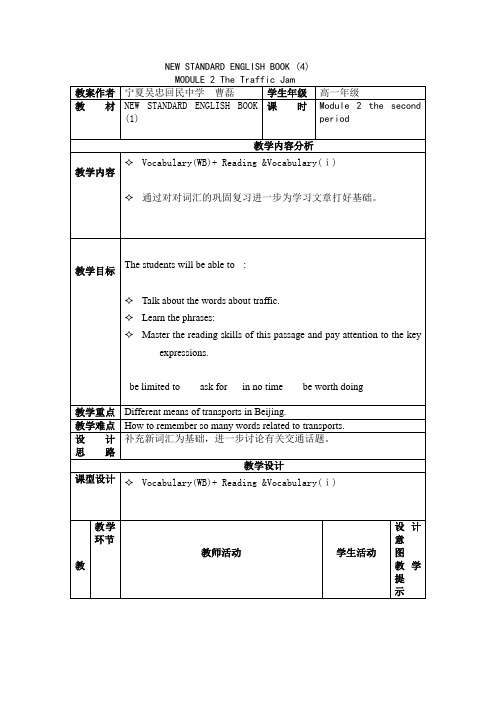
NEW STANDARD ENGLISH BOOK (4)MODULE 2 The Traffic Jam教案作者宁夏吴忠回民中学曹磊学生年级高一年级教材N EW STANDARD ENGLISH BOOK(1) 课时Module 2 the secondperiod教学内容分析教学内容✧Vocabulary(WB)+ Reading &Vocabulary(ⅰ)✧通过对对词汇的巩固复习进一步为学习文章打好基础。
教学目标The students will be able to :✧Talk about the words about traffic.✧Learn the phrases:✧Master the reading skills of this passage and pay attention to the keyexpressions.be limited to ask for in no time be worth doing教学重点D ifferent means of transports in Beijing.教学难点H ow to remember so many words related to transports.设计思路补充新词汇为基础,进一步讨论有关交通话题。
教学设计课型设计✧Vocabulary(WB)+ Reading &Vocabulary(ⅰ)教教学环节教师活动学生活动设计意图教学提示学流程教学流程导入Step 1✧Check the home works in new words part.·correct the answers together.Step 2 lead-inYesterday we learned Top Tips for wordTravelers. Who would like to give us someadvices on traveling.Step 3. Reading1. Fast readingAsk Ss to read the text silently and quicklyand answer the question.What means of transport can you use when youget round in Beijing?2. Carefull readingAsk Ss to read the text again and answer thequestions in Activity 2 on page 13.Ask Ss to find the words of Activity 3 in thepassage. Make sure they understand theirmeanings well. Then get them to match thewords with the meanings given.3 Detail reading1. Ask Ss to discuss the important and difficultlanguage points in groups. Then give themsome explanation.✧Correcttheanswerand checkit.✧Makenotes✧Discussion thisquestions✧Givesomeinformation✧Studentswritedownthem and知识新授Language Points·Travel light·look like a local person.·keep your document safe.·keep clean.·be shop-wise.2. Ask Ss to listen to the tape and fill themissing words from passage.Public transport provides a _______way to______ in Beijing. There are 20,000 buses andtrolleybuses in Beijing, but they can get very______. It’s a good idea to avoid pub lictransport during the _______. Fares are cheap,______at 1 Yuan. Air-conditioned buses costmore.Bused _______1 to 100 are _______ totravel within the city center. Higher numbershave destinations in the suburbs. Touristsshouldn’t miss the 103 bus which _______ oneof the impressive routes, past Forbidden Cityand the White Pagoda in BeiHai Park. If youget on a double –Decker bus, make sure you sit______. You will have a good _______of therapidly changing city.Most buses run from about 5:00 am tomidnight. _______, there is also a night service,provided by buses with a number in the 200s.There are four underground _______ inBeijing, and several lines are under ______.Trains are fast and ______, but rush hours canbe terrible. A ___ trip costs 3 Yuan. Stationnames are marked by pinyin. The undergroundis open from 5:00 am to 11:00 pm.✧Writedown thecorrectanswers✧Makenotes✧Underlined thesentenceswhichyou can’tunderstand.·Make notes练习巩固总结✧板书/课件设计提示MODULE 2 The Traffic JamVocabulary(WB)+ Reading &Vocabulary(ⅰ)Transprot inBeiJing adveantage disadveantage taxi24 hours on thestreet/easy toget.Buses&trolleybusundergroundpedicabs课后作业✧Read the passage more and understand it.✧Preview function。
外研版四年级英语上册Module 2 描述正在发生的事情

外研版四年级英语上册Module 2 描述正在发生的事情一、重点词汇。
(英汉互译)(一)日常活动类1. 读, 阅读2. 拍摄3. 照相4. 玩玩具火车5. 放风筝6. 看电视7. read a book8. do one’s homework9. play football10. ride a bike(二)动词类1. 听2. 说话, 交谈3. listen to4. 看5. 和……交谈(三)其他1. 照片2. 中国3. 孩子们(child 的复数形式)4. running5. 这些二、重点句子。
(英汉互译)(一)描述某人正在做某事1. 他正在拍照。
___________________________________________________________________2. 她正在读书。
___________________________________________________________________ 3. 他们正在骑自行车。
___________________________________________________________________ 4. I’m listening to music.___________________________________________________________________(二)询问某人正在做什么及回答1. ——你正在干什么?——我正在和我的朋友交谈。
___________________________________________________________________ ___________________________________________________________________ 2. ——汤姆正在做什么?——他正在读一本关于中国的书。
___________________________________________________________________ ___________________________________________________________________ 三、重点语法。
外研版Book 2module4reading 教案 Word版本
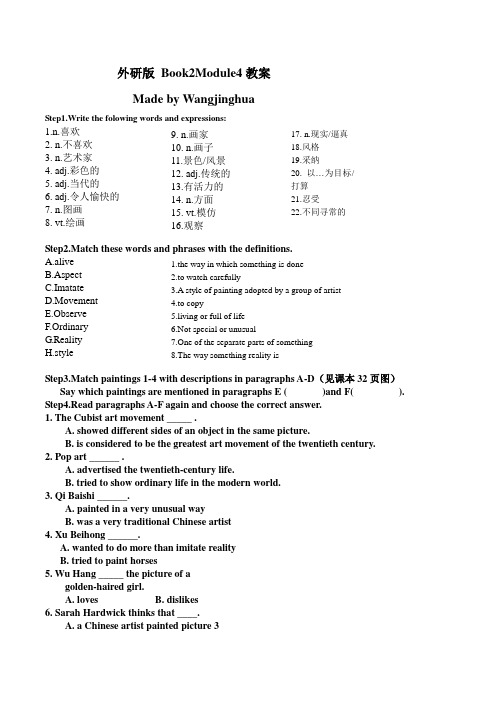
外研版 Book2Module4教案Made by Wangjinghua Step1.Write the folowing words and expressions:1.n.喜欢2. n.不喜欢3. n.艺术家4. adj.彩色的5. adj.当代的6. adj.令人愉快的7. n.图画8. vt.绘画Step2.Match these words and phrases with the definitions.A.aliveB.AspectC.ImatateD.MovementE.ObserveF.Ordinary G .Reality H.styleStep3.Match paintings 1-4 with descriptions in paragraphs A-D (见课本32页图)Say which paintings are mentioned in paragraphs E ( )and F( ).Step4.Read paragraphs A-F again and choose the correct answer.1. The Cubist art movement _____ .A. showed different sides of an object in the same picture.B. is considered to be the greatest art movement of the twentieth century.2. Pop art ______ .A. advertised the twentieth-century life.B. tried to show ordinary life in the modern world.3. Qi Baishi ______.A. painted in a very unusual wayB. was a very traditional Chinese artist4. Xu Beihong ______.A. wanted to do more than imitate realityB. tried to paint horses5. Wu Hang _____ the picture of agolden-haired girl.A. lovesB. dislikes6. Sarah Hardwick thinks that ____.A. a Chinese artist painted picture 39. n.画家 10. n.画子 11.景色/风景 12. adj.传统的 13.有活力的 14. n.方面 15. vt.模仿 16.观察 17. n.现实/逼真 18.风格 19.采纳 20. 以…为目标/打算 21.忍受 22.不同寻常的1.the way in which something is done2.to watch carefully3.A style of painting adopted by a group of artist4.to copy5.living or full of life6.Not special or unusual7.One of the separate parts of something8.The way something reality isB. Pablo Picasso painted picture 3nguage Points1.This is a painting by the Spanish artist, Pablo Picasso, considered to be the greatestwestern artist ofthe twentieth century.翻译:____________________________________________________________________________ _______consider(1)vt. & vi. consider doing(考虑做某事);consider +where(wh开头的疑问词)+ to dosth (考虑什么时候/去哪里做某事)①我们学校很多学生在考虑去国外学习。
Book4 Module 2 period4
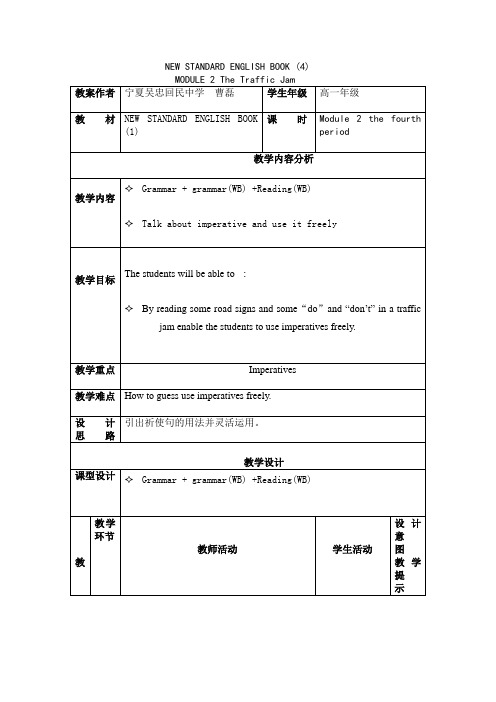
NEW STANDARD ENGLISH BOOK (4)MODULE 2 The Traffic Jam教案作者宁夏吴忠回民中学曹磊学生年级高一年级教材NEW STANDARD ENGLISH BOOK(1) 课时Module 2 the fourthperiod教学内容分析教学内容✧Grammar + grammar(WB) +Reading(WB)✧Talk about imperative and use it freely教学目标The students will be able to :✧By reading some road signs and some“do”and “don’t”in a trafficjam enable the students to use imperatives freely.教学重点Imperatives教学难点How to guess use imperatives freely.设计思路引出祈使句的用法并灵活运用。
教学设计课型设计✧Grammar + grammar(WB) +Reading(WB)教教学环节教师活动学生活动设计意图教学提示学流程教学流程导入Step 1 revision✧Go over the phrases used to give advice.·Deal with Ex3 on page 73.·check the answers with whole class.Step 2 Grammar·Show some road signs on the powerpointand ask the students what they should do?1. Deal with Exx1-2 on page 162. Present Ss the grammatical rules of theimperatives.Imperatives-present simple tense1. Go and wash your hands.2. Be quiet, please.(Please be quiet.)3. Be kind to our sister.4. Look out!Danger!Finish activity 1—3 on page 73.Step 3 ExplanationT: we use imperatives for different reasons,such as telling people what to do, giveinstructions and advice, makingrecommendations and suggestions, and thenmake offers.✧Go over thephrasesused to giveadvice.✧Make notes✧Follow theexamples tomake thesentencesone by one.✧Give someinformations✧Studentswrite down知识新授Step 4 Reading (WB)Work in pairs. Look at the title of the passageand the headings. Predict the advice that maybe mentioned----activity 8.Read the passage and match the headings withparagraphs----activity 9Find the words in the passage and choose theright answers----activity 10Step 5 DiscussionHave a discussion about activity 11.✧Match itwith theinstruction✧Find out thecorrect oneand fill it .check theanswerstogether.练习巩固Do vocabulary exercise on WB on page 74.总结✧板书/课件设计提示MODULE 2 The Traffic JamIntroduction + Listening & speaking +Everyday English+ pronunciationhelicopter trolleybus truck coach1.Have you ever been stuck in the Traffic Jam2. What did you do at that time?课后作业✧Remember those words and dictation tomorrow.✧Preview reading &vocabulary.教学反思。
四年级英语Test of Module 2
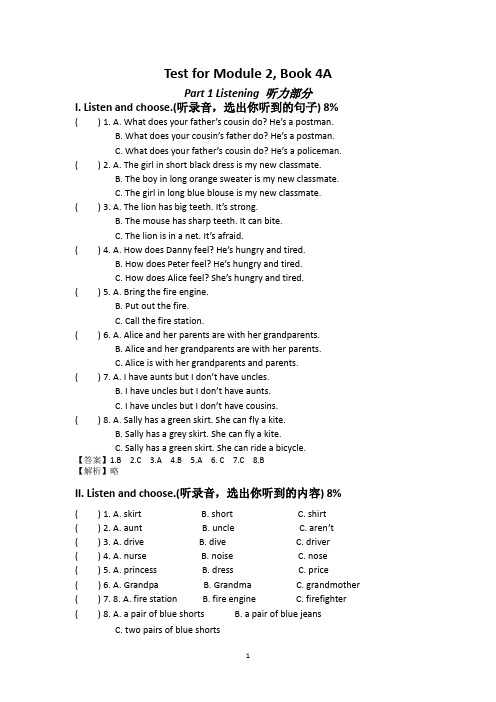
Test for Module 2, Book 4APart 1 Listening 听力部分I. Listen and choose.(听录音,选出你听到的句子) 8% ( ) 1. A. What does your father’s cousin do? He’s a postman.B. What does your cousin’s father do? He’s a postman.C. What does your father’s cousin do? He’s a policeman. ( ) 2. A. The girl in short black dress is my new classmate.B. The boy in long orange sweater is my new classmate.C. The girl in long blue blouse is my new classmate.( ) 3. A. The lion has big teeth. It’s strong.B. The mouse has sharp teeth. It can bite.C. The lion is in a net. It’s afraid.( ) 4. A. How does Danny feel? He’s hungry and tired.B. How does Peter feel? He’s hungry and tired.C. How does Alice feel? She’s hungry and tired.( ) 5. A. Bring the fire engine.B. Put out the fire.C. Call the fire station.( ) 6. A. Alice and her parents are with her grandparents.B. Alice and her grandparents are with her parents.C. Alice is with her grandparents and parents.( ) 7. A. I have aunts but I don’t have uncles.B. I have uncles but I don’t have aunts.C. I have uncles but I don’t have cousins.( ) 8. A. Sally has a green skirt. She can fly a kite.B. Sally has a grey skirt. She can fly a kite.C. Sally has a green skirt. She can ride a bicycle.【答案】1.B 2.C 3.A 4.B 5.A 6. C 7.C 8.B【解析】略II. Listen and choose.(听录音,选出你听到的内容) 8%( ) 1. A. skirt B. short C. shirt ( ) 2. A. aunt B. uncle C. aren’t ( ) 3. A. drive B. dive C. driver ( ) 4. A. nurse B. noise C. nose ( ) 5. A. princess B. dress C. price ( ) 6. A. Grandpa B. Grandma C. grandmother ( ) 7. 8. A. fire station B. fire engine C. firefighter ( ) 8. A. a pair of blue shorts B. a pair of blue jeansC. two pairs of blue shorts【答案】1.A 2.A 3.A 4.B 5.C 6.B 7.C 8.A【解析】略III. Listen and judge.(听录音判断,正确的用T表示,错误的用F表示) 6%【答案】1.F 2.T 3.F 4.F 5.T 6. T【解析】略IV. Listen and choose.(听录音,选出正确的应答句) 6%( ) 1. A. Yes, I have. B. No, I don’t. C. I have three aunts.( ) 2. A. She’s my cousin. B. He’s my cousin. C. She’s my friend.( ) 3. A. O.K. B. Thank you. C. That’s all right.( ) 4. A. Yes, he is. B. No, he has. C. Yes, he does.( ) 5. A. We eat ice-creams. B. We eat cakes. C. We eat mooncakes. ( ) 6. A. She’s a driver. B. She can drive. C. He’s a driver.【答案】1.B 2.B 3.C 4.A 5.C 6. A【解析】略V. Listen and choose.(听录音,选出正确的答案) 6%( ) 1. A. He’s my uncle. B. She’s my aunt. C. He’s my grandfather. ( ) 2. A. She can draw. B. She can drive. C. She can dive. ( ) 3. A. They’re sharp. B. They’re small. C. It’s sharp( ) 4. A. He’s a bus driver. B. He has a blue bus. C. He can drive a bus. ( ) 5. A. Yes, he has. B. No. C. No, she hasn’t. ( ) 6. A. The green sweater. B. The yellow skirt. C. The pink blouse 【答案】1.B 2.B 3.A 4.B 5.B 6. B【解析】略VI. Listen and judge(听录音判断,正确的用T表示,错误的用F表示) 6% ( ) 1. Bill has a happy family.( ) 2. Bill’s mother is a doctor. She is not tall.( ) 3. Bill’s father isn’t a doctor. H e’s 38.( ) 4. Bill’s father can’t cook. But he can drive.( ) 5. Bill is fifteen. He can swim.( ) 6. This is a picture of Bill’s family.【答案】1.T 2.F 3.T 4.T 5.F 6. T【解析】略Part 2 Reading and Writing笔试部分I. Copy. (正确抄写句子,注意大小写和标点符号) 8%is your father a police officer danny no hes a firefighter_________________________________________________________________ 【答案】Is your father a police officer, Danny? No, he’s a firefighter.【解析】略II. Translate.(中英互译) 10%1.吉尔的叔叔___________________【答案】Jill’s uncle【解析】略2.勇敢的消防员______________________【答案】the brave firefighter/ fireman【解析】也可写成(the)brave firefighters/ firemen3. 两位警察__________________【答案】two police officers/ policemen【解析】略4. 一条蓝色牛仔裤______________________【答案】a pair of blue jeans【解析】略5. 公交车司机_____________________【答案】the bus driver【解析】也可翻译成(the)bus drivers6. 红白色连衣裙_____________________【答案】a red and white dress/ a white and red dress【解析】也可翻译成the red and white dress/the red and white dresses7. catch the fish__________________【答案】抓(这条/ 那条)鱼【解析】也可翻译成捉(这只/ 那只)鱼8. a pretty princess ______________________【答案】一个漂亮的公主【解析】也可翻译成一个美丽的公主/ 一个好看的公主9. help people_____________________【答案】帮助人们【解析】略10.wash the dishes_____________________【答案】洗碗(盘子)【解析】也可翻译成洗这些碗/ 洗那些碗III. Look and write. (按要求写单词) 8%1.do (第三人称单数)_______________【答案】does【解析】略2. aren’t(同音词)_____________________【答案】aunt【解析】略3. driver(动词)____________________【答案】drive【解析】末尾是e的动词,变职业只需加r;同样driver去r就变成相应动词。
Book4 Module 2 period 1
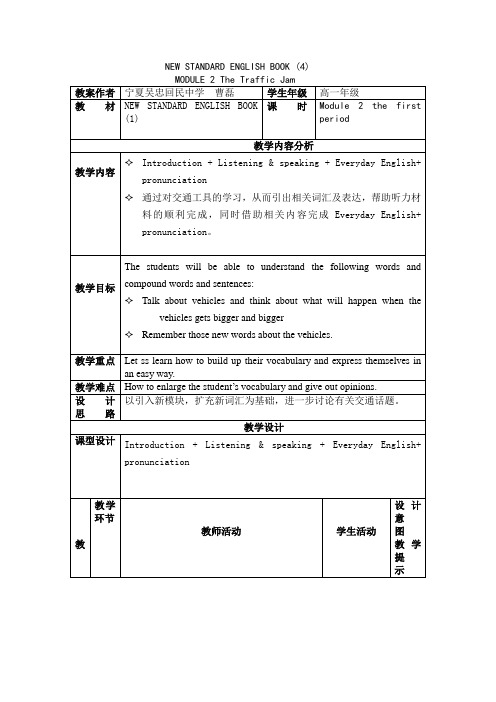
NEW STANDARD ENGLISH BOOK (4)MODULE 2 The Traffic Jam教案作者宁夏吴忠回民中学曹磊学生年级高一年级教材N EW STANDARD ENGLISH BOOK(1) 课时Module 2 the firstperiod教学内容分析教学内容✧Introduction + Listening & speaking + Everyday English+pronunciation✧通过对交通工具的学习,从而引出相关词汇及表达,帮助听力材料的顺利完成,同时借助相关内容完成Everyday English+ pronunciation。
教学目标The students will be able to understand the following words and compound words and sentences:✧Talk about vehicles and think about what will happen when thevehicles gets bigger and bigger✧Remember those new words about the vehicles.教学重点L et ss learn how to build up their vocabulary and express themselves in an easy way.教学难点H ow to enlarge the student’s vocabulary and give out opinions.设计思路以引入新模块,扩充新词汇为基础,进一步讨论有关交通话题。
教学设计课型设计Introduction + Listening & speaking + Everyday English+ pronunciation教教学环节教师活动学生活动设计意图教学提示学流程教学流程导入Step 1 IntroductionActivity 1:✧Ask the SS to macth those words with theirdefinitions.Ask Ss to work in pairs and answer questionsaccording to the box in Activity 2.1. How do you travel every day?2. How do you travel sometimes?3. How do you often travel?4. What have you never traveled by?Step 2 DiscussionAsk Ss to answer the questions Activity 3.1. How long were you in the jam?2. What did you do then3. If you haven’t met a traffic jam, can youimagine what will happen in it?Ask students to predict the traffic problem andtick the topic.Step 3 Listening &speaking·Listen and match the traffic situations with thespeakers.Step 2. Listening and SpeakingListen to people of Beijing speaking abouttraffic problems in the city. Before you listen,tick you think they will talk about.Listen and match the traffic situations with thespeakers.✧✧Correcttheanswerand checkit.✧Makenotes✧Discussion thisquestions✧Givesomeinformations知识新授·listen carefully and find out the correctanswers of activity 3.Step 4 Everyday EnglishAccording to the listening materias and find outthe correct answers of the everyday English.List out the key phrases on the blackboard.·Have you ever been stuck in a traffic jam?Ask Ss to complete the exercises on page 18.Step 5 Pronunciation·listen and read after the tape.Ask Ss to read the following sentences andpay attention to the underlined sounds.·listen to the stress words in the sentence.✧Writedown thecorrectanswers✧Find outthecorrectone andfill it .✧Payattation tothepronunciation andunderlinethe stressword.练习巩固Do vocabulary exercise on WB on page 74.总结✧板书/课件设计提示MODULE 2 The Traffic JamIntroduction + Listening & speaking +Everyday English+ pronunciationhelicopter trolleybus truck coach1.Have you ever been stuck in the Traffic Jam2. What did you do at that time?课后作业✧Remember those words and dictation tomorrow.✧Preview reading &vocabulary.教学反思。
外研版高中英语必修四高一英语Book 4 Module2同步检测试题
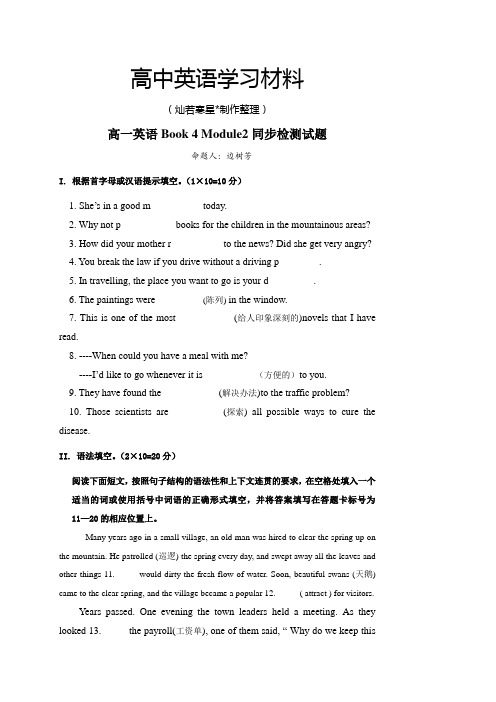
高中英语学习材料(灿若寒星*制作整理)高一英语Book 4 Module2同步检测试题命题人: 边树芳I. 根据首字母或汉语提示填空。
(1×10=10分)1. She’s in a good m__________ today.2. Why not p_________ books for the children in the mountainous areas?3. How did your mother r__________ to the news? Did she get very angry?4. You break the law if you drive without a driving p________.5. In travelling, the place you want to go is your d_________.6. The paintings were _________(陈列) in the window.7. This is one of the most ___________(给人印象深刻的)novels that I have read.8. ----When could you have a meal with me?----I’d like to go whenever it is __________(方便的)to you.9. They have found the ___________(解决办法)to the traffic problem?10. Those scientists are __________(探索) all possible ways to cure the disease.II. 语法填空。
(2×10=20分)阅读下面短文,按照句子结构的语法性和上下文连贯的要求,在空格处填入一个适当的词或使用括号中词语的正确形式填空,并将答案填写在答题卡标号为11—20的相应位置上。
Book4 Module2 Traffic Jam
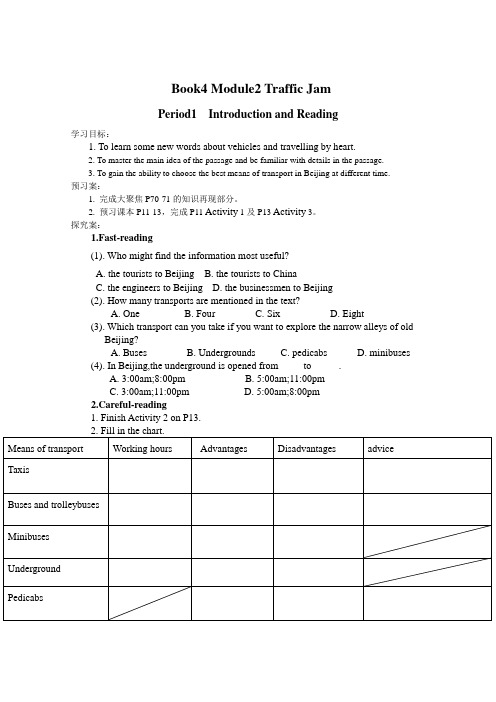
Book4 Module2 Traffic JamPeriod1 Introduction and Reading学习目标:1. To learn some new words about vehicles and travelling by heart.2. To master the main idea of the passage and be familiar with details in the passage.3. To gain the ability to choose the best means of transport in Beijing at different time.预习案:1. 完成大聚焦P70-71的知识再现部分。
2. 预习课本P11-13,完成P11 Activity 1及P13 Activity 3。
探究案:1.Fast-reading(1). Who might find the information most useful?A. the tourists to BeijingB. the tourists to ChinaC. the engineers to BeijingD. the businessmen to Beijing(2). How many transports are mentioned in the text?A. OneB. FourC. SixD. Eight(3). Which transport can you take if you want to explore the narrow alleys of oldBeijing?A. BusesB. UndergroundsC. pedicabsD. minibuses(4). In Beijing,the underground is opened from ____ to _____.A. 3:00am;8:00pmB. 5:00am;11:00pmC. 3:00am;11:00pmD. 5:00am;8:00pm2.Careful-reading1. Finish Activity 2 on P13.2. Fill in the chart.Means of transport Working hours Advantages Disadvantages advice TaxisBuses and trolleybusesMinibusesUndergroundPedicabs3. Post-readingRetell the passage according to the chart as well as the questions above.检测案:关上书,完成语法填空题(每空所填单词不能多于3个)。
Book4 module2 Traffic jam (grammar)

Book4 module2 Traffic jam (grammar)祈使句概念:表示命令,请求,建议,劝告或号召的句子叫做祈使句。
祈使句可分为第二人称祈使句和第一,三人称祈使句。
祈使句的主语为you, 通常省略, 谓语动词使用原形, 句末用感叹号或句号。
祈使句的主语为第一, 三人称句子结构为:Let+ 动词原形+其他成分或Let’s+动词原形+其他成分。
例句:主语为第二人称(1). Switch off the motor.(2). Follow the rules of the road.(3). Don’t leave the light on.主语为第一,三人称Let me see.Let her come here at eight o’clock.Let us help you tidy your room.Let’s have a break.1.祈使句的否定式:Don’t +动词原形Don’t be nervous !Don’t make any noise in the reading room.2. 加强祈使句的语气:在谓语前+do/youDo be patient!Do write back when you receive his letter.Tom, you clean the room.Don’t you be late again next time!3. 祈使句表祝愿的方式:Success to you !Wish you a good journey.May you have a happy marriage.Here’s to your success!Allow me to propose a toast to our friendship!4. 含let 的祈使句:Let somebody+ v/adv.Let’s be friends.Let me have a try, will you ?Let him in, please.5. 不用动词开头的祈使句。
Book4module2Traffic Jam 词汇
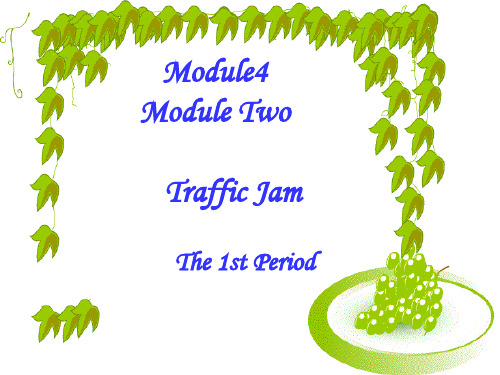
3)be impressed on one’s mind /memory 被印在脑海里 翻译: 他的话铭刻在我的记忆里. His words are strongly impressed on my mind. (2)impression n.印象 给某人留下…印象 leave/have/make a/an deep(good/bad…)impression on sb 翻译: 这本书给他留下了深刻印象. The book left /made a deep impression on him.
4. convenient adj.方便的,便利的,合适的 (1) sth be convenient to /for sb 某物对某人是 方便的 (2) If it is convenient to sb 假如某人方便的话 翻译: (1)这列火车对你方便吗? Will the train be convenient to you ? (2)今天如果你方便的话,请你在回家的路上为 我把这封信邮寄出去。 If it is convenient to you today ,please post the letter for me on your way home.
【总结归纳】 permit vt. 许可, 允许。 permit sth. / doing sth. permit sb. to do sth. vi. (事物)允许, 使有可能。通常用在条 件句中if weather/time permits; n. 许可证; 执照
【链接】 permission n. 允许; 许可 【拓展】 ask permission for sth. 请求许可…… with / without (one’s) permission 经(某人)许可 / 未经(某人)许可
Exercise for Book4 Module 2 外研社

Exercise for Book4 Module 2Ⅰ.单项填空1.________ for the worst in advance and you won't be disappointed.A.Prepare B.When preparingC.Having prepared D.If you prepare2.I don't like to watch this. There's a better program than this on CCTV 6.Please ________.A.turn back B.turn onC.switch off D.switch over3.Can the running water company _______enough water _______the citizens?A.supply;to B.provide;withC.offer;to D.give;with4.A new road is ________ here. They hope to finish it next month.A.under way B.under controlC.under repair D.under construction5. You can find the suitcase easily, because it is with name and number.A. tiedB. markedC. signedD. attached6.You must take your raincoat with you. Don't get ______ in the rain.A.to be caught B.catchingC.to catch D.caught7.Will you drop in at my house this afternoon if________?A.it is convenient for you B.you are convenientC.it is convenient of you D. you still be convenient8.Many people consider it ________,from which a lot of children benefit.A.a worth doing cause B.a cause worth to doC.a worthwhile cause D.a worthless cause9.More than 60,000 people,including her only son,got killed in the terrible earthquake. I wonder what her ________would be when the news reached her.A.impression B.commentC.opinion D.reaction10.________,there was also no lights in the houses along the street.A.There not only were no streetlightsB.Not only there were no streetlightsC.Not only were there no streetlightsD.There were only no streetlightsⅡ.完形填空Some years ago,an American policeman found a woman lying near a lonely road. She did not appear to have __1__,but she was trembling and clearly in a state of shock,so he rushed her to the __2__ hospital. She began to tell the doctor on duty a story which was __3__ in all respects. She had been __4__ along a country road __5__ she had been stopped by a flying saucer __6__ in front of her. She had been forced to leave the car and __7__ the flying saucer by creatures which looked like human beings and which could easily make themselves __8__ although they could not __9__.They could read her thoughts and she could read __10__.They tested her politely and allowed her to __11__ after carrying out a number of tests on her. As she otherwise seemed to be __12__,the doctor decided that she was probably suffering from the side effects of some medicine. The woman insisted on being __13__ to go home,but when she gave her address,it was in a town over a thousand miles from the __14__.The police then started to make inquires and soon __15__ that there was already a __16__ going on for the woman,__17__ husband badly reported that she had __18__.Her car had been found with the driver's door open and the engine running.__19__ the car the surface of the road had been completely destroyed—not by an explosion or anything of that kind,but __20__ a large,round,white,hot object had burnt through it.1.A. a rest B.an accidentC.a test D.an idea2. A. most famous B. most expensiveC. bestD. nearest3. A. funny B. sadC. movingD. astonishing4.A. driving B.walking C.running D.wandering5.A. as B.since C.when D.if6.A. rising B.flyingC.running D.landing7.A. enter B.visit C.watch D.clean8.A. noticed B.seenC.understood D.heard9.A. move B.think C.read D.speak10. A. their B.theirs C.her D.hers11.A. leave B.stay C.drive D.watch12.A. happy B.thankfulC.nervous D.normal13.A. told B.allowedC.advised D.ordered14. A. earth B. carC. roadD. hospital15. A. decided B. believedC. supposedD. discovered16. A. discussion B. searchC. movementD. meeting17.A. which B.when C.whose D.where18.A. disappeared B.fledC.returned D.left19.A. Behind B.In front ofC.Below D.At the foot of20.A. as B.if C.as if D.only ifⅢ.阅读理解You may ride on your bicycle in a rush to get to school every morning. You may fight to get a bit of space on a bus or on the subway. You may also watch taxis crawl their way through traffic jams.No matter where you are,all big cities around the world have traffic jams these days. But although they all have their problems,many cities also have a type of transport that has become a cultural icon (文化标识).In London to avoid the traffic above ground,people use the “underground”,also called the “Tube”.The city has the oldest and most complicated underground railway system in the world and is the pride of many Londoners. With 12 lines and 275 stations across the city,the Tube,is normally the quickest and easiest way of getting around London. In London,you are never far from a Tube station.New York is famous for its Yellow cabs. They serve as a quick and easy way of getting across Manhattan,where the subway doesn't take you everywhere. Stopping a cab is easy;just stick out your arm like you do in any city. But,with over 12,000 yellow cabs in the Big Apple,they also cause traffic jams.Since 1873 when the first cable car started public service,the slow and noisy vehicle has been asymbol of San Francisco. Although once damaged by a serious earthquake and challenged by cars,it is never caught in traffic jams and provides better views than the subway.But there are no such symbols in Los Angeles. If you visit you'd better rent a car. The city's public transportation is terrible. It can take hours to get across town by bus. The subway covers just a small part of the city centre. The light rail line only runs between the Long Beach hotel area and the city centre. That's why Angelinos love their private cars more than any other people in the world.1.If you have a chance to London and want to avoid the traffic jam,you'd better ________.A.ride vehicle B.take a taxiC.use subway D.rent a car2.Which type of transportation has become a cultural icon of the Big Apple?A.Noisy vehicle. B.Cable cars.C.Subway. D.Yellow cabs.3.People in Los Angeles like to hire private cars because of the following EXCEPT that ________.A.the public transportation is terribleB.it is not expensive to take a private carC.the underground railway covers a small part of the city centerD.people have to spend hours getting across the Los Angeles4.The passage mainly tells us ________.A.how big cities in the foreign countries keep on movingB.how people in the city avoid the traffic jamsC.why London has the oldest and complicated subwayD.why people call New York the Big Apple厚积薄发:积累本次小练习中的短语、句型:单选题:1.【解析】 句意为:事先做好最坏的准备,你就不会失望。
山东省淄博市淄川般阳中学高中英语必修四教学课件:book4 Module2单词
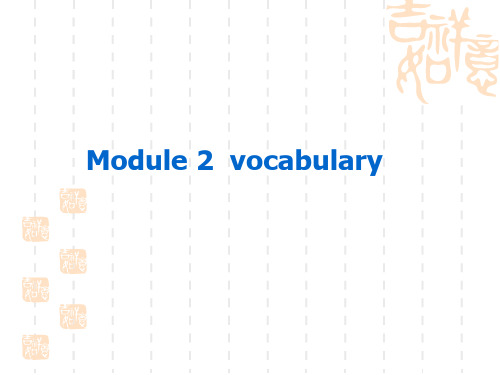
a future city’s limitszxxk
(经常用复数)
探究三: convenient 【课文原句】Trains are fast and convenient, but
rush hours can be terrible. (Page 12) adj. 方便的,便利的
A. you are convenient
B. you will be convenient
C. it is conconvenient to you
5. The chairman asked me to _________ my
speech to 20 minutes.
A. convenient
B. fair
C. easy
D. comfortable
3. Weather ________, we’ll go shopping.
A. permits
B. permitted
C. having permitted D. permitting
4. Come and see me whenever ________
▪ 1. In the Great Depression, the American government couldn’t find good solutions _____ the unemployment problem.
A. of B. to C. on D. about
▪ 2. I decide to pay a visit to you, but I don’t know whether it is quite _________ to you.
外研版高中英语Book 4 Module 2 单元测试试题 (答案解析)
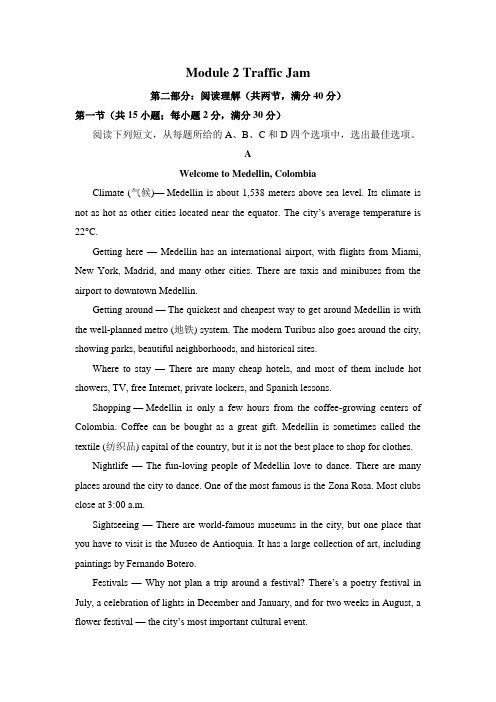
Module 2 Traffic Jam第二部分:阅读理解(共两节,满分40分)第一节(共15小题;每小题2分,满分30分)阅读下列短文,从每题所给的A、B、C和D四个选项中,选出最佳选项。
AWelcome to Medellin, ColombiaClimate (气候)— Medellin is about 1,538 meters above sea level. Its climate is not as hot as other cities located near the equ ator. The city’s average temperature is 22°C.Getting here —Medellin has an international airport, with flights from Miami, New York, Madrid, and many other cities. There are taxis and minibuses from the airport to downtown Medellin.Getting around — The quickest and cheapest way to get around Medellin is with the well-planned metro (地铁) system. The modern Turibus also goes around the city, showing parks, beautiful neighborhoods, and historical sites.Where to stay —There are many cheap hotels, and most of them include hot showers, TV, free Internet, private lockers, and Spanish lessons.Shopping — Medellin is only a few hours from the coffee-growing centers of Colombia. Coffee can be bought as a great gift. Medellin is sometimes called the textile (纺织品) capital of the country, but it is not the best place to shop for clothes.Nightlife —The fun-loving people of Medellin love to dance. There are many places around the city to dance. One of the most famous is the Zona Rosa. Most clubs close at 3:00 a.m.Sightseeing — There are world-famous museums in the city, but one place that you have to visit is the Museo de Antioquia. It has a large collection of art, including paintings by Fernando Botero.Festivals —Why not plan a trip around a festival? There’s a po etry festival in July, a celebration of lights in December and January, and for two weeks in August, a flower festival —the city’s most important cultural event.21. How is the climate of Medellin?A. It is pleasant.B. It is very hot.C. It is quite dry.D. It is changeable.22. What can we learn about the Museo de Antioquia?A. It is an art market.B. It is a must-see museum.C. It is the best place to shop.D. It is a coffee-growing center.23. When is the flower festival in Medellin?A. In July.B. In August.C. In January.D. In December.BMike Hayes of Rochelle, Illinois, proved he was smart in his first year at college. In 1987, while he was a student in the first year of the University of Illinois, he had gotten $2,500 from a job working at a store, but that money would not go far to pay the four years of tuition (学费) and college expenses that added up to around $28,000. His middle-class family had already put his older brothers through college. While Mike’s parents would have helped him to p ay, Mike decided he did not want his parents going into debt (债务) for him. He came up with an idea to solve this problem.Mike wrote to Chicago Tribune writer Bob Greene. He wanted each of the newspaper’s readers to send him a penny (分). Greene thought the idea sounded fun and agreed to do it. He shared Mike’s letter with his readers on September 6, 1987.“Just one penny,” Mike said. “A penny doesn’t mean anything to anyone. If everyone who is reading your reports looks around the room right now, there will be apenny on the corner of the desk, or on the floor. That’s all I’m asking. A penny from each of your readers.”In less than a month, the Many Pennies for Mike fund (基金) had around $23,000. Donations (捐款) were received from every state in the United States, and even Mexico, Canada, and the Bahamas. So, Mike achieved his $28,000 goal and went on to learn food science from the University of Illinois.In the end, Mike had this to say about the whole thing, “I just want to express my thanks to everyone ... r ight now I’m feeling that the world is a pretty great place.”24. What troubled Mike when he was in his first year at college?A. He couldn’t afford his tuition.B. He failed to find a part-time job.C. His parents were unwilling to help.D. His parents had huge debts to pay off.25. Why did Mike write to Greene?A. To ask for help.B. To send his greetings.C. To express his thanks.D. To introduce himself.26. What can we infer from Paragraph 4 about Mike?A. His fund needed more donations.B. He became rich and successful.C. His plan really worked.D. He asked for too much.27. What’s the best title for the text?A. Pennies for readersB. The value of educationC. Mike’s business in collegeD. The one penny college fundCIt’s early mor ning, and Katie Smith hears a rooster (公鸡) crowing (报晓). It’s time to get up and start working. She and her husband, Chris Cashen, start the day early. They own and run the Farm at Miller’s Crossing, in Hudson, New York.With the help of 10 workers and, sometimes, the Cashen kids — Lael, 12, Connelly, 10, AnneMae, 8, and Christopher John, 6 — Smith and Cashen harvest crops (收割农作物) during much of the year. They grow vegetables and other plants. They also raise and care for some animals.Because the Farm at M iller’s Crossing grows different kinds of crops, Cashen says the biggest challenge (挑战) is timing. Several times a year, workers prepare the soil and plant crops. At other times, they transfer (转移) plants from the greenhouse into the fields. The farmers store the fall vegetables in coolers and sell them throughout the winter.Cashen and Smith grow their crops without the use of chemicals. When crops are ready to be harvested, workers pick them daily, wash them, and put them in boxes. In June, they work up to 70 hours a week. As fall nears, workers try to finish the daily harvesting while there is still daylight. The crops are sold through programs that provide buyers with fresh produce weekly.Living on a farm has its perks. The Cashen kids swim in a river from which the crops get their water. They ride their bikes in wide-open spaces. When harvesting tomatoes, they sometimes have exciting tomato fights. They have a big family with which to share their adventures.Everyone takes part in the business. The kids feed the horses. The boys care for the pigs. Lael says she likes transferring plants and selling produce. “It’s fun and really busy,” says Lael, “but it’s just a part of life.”28. What can we learn about the Cashen family?A. They look needy.B. They lead a busy life.C. They live on selling animals.D. They do all the work on their own.29. What’s the most difficult thing on the Farm?A. Storing the fall vegetables.B. Growing crops as fast as possible.C. Moving plants out of the greenhouse.D. Planning when to plant and harvest.30. What does the underlined word “perks” in Paragraph 5 mean?A. Price.B. Reasons.C. Discomfort.D. Advantages.31. What is Lael’s attitude toward her life on the Farm?A. She enjoys it.B. She is proud of it.C. She is uninterested in it.D. She feels unsatisfied with it.DAnybody who has a long daily commute (通勤) knows the feeling of sitting in traffic with nothing to do but wait. Now, a study suggests that long commutes can take away more than just valuable time, they also have a bad influence on your fitness (健壮) and health.Earlier research has connected longer commutes with obesity (肥胖). But this new research is believed to be “the first study to show that long commutes can reduce exercis e time,” explained lead researcher Christine M. Hoehner of Washington University in St. Louis.Long commutes are connected with “higher weight, lower fitness levels and higher blood pressure (血压), all of which are likely to lead to heart disease,” she said. One discovery that Hoehner found a little surprising was how“being caught in heavy traffic can lead to higher blood pressure.”Here’s how the research was done: Scientists studied 4,297 locals from Austin, Texas. They recorded their commuting distances, body mass indices (体重指数) and blood pressure. The locals reported their physical activity for the last three months.What did scientists learn? Commuters who said they drove longer distances also reported they took part in less active physical activity. They had lower fitness levels, greater body mass indices and higher blood pressure.Between 1960 and 2000, workers commuting in private cars jumped from 41.4 million to 112.7 million, according to the U.S. Department of Transportation. And as suburbs have spread across the nation since the 1950s, commuter miles have increased too, along with the time drivers spend sitting in the car, according to the U.S. Census Bureau.For many commuters, moving closer to work isn’t a choice but Hoehner said there are ways t hat can lead to more exercise. “Commuters should find ways to work physical activity into their workdays by doing things like walking during work breaks. Employers could also help by encouraging fitness breaks,” said Hoehner.32. What did Hoehner find?A. The longer the exercise time, the better.B. Some diseases lead to higher blood pressure.C. Lower fitness levels result from heart disease.D. The busier the traffic, the higher the blood pressure.33. How did scientists do the research?A. By doing a simple test.B. By collecting information.C. By giving physical checks daily.D. By talking to locals face to face.34. What has happened since the 1950s?A. The area of suburbs has reduced.B. The number of commuters has dropped.C. Many people have given up driving cars.D. Many people have moved farther from workplaces.35. What is Hoehner trying to do in the last paragraph?A. Offer help.B. Give advice.C. Find excuses.D. Send warnings.第二节(共5小题;每小题2分,满分10分)根据短文内容,从短文后的选项中选出能填入空白处的最佳选项。
外研版高中英语必修四Book4Module2TrafficJam

高中英语学习资料madeofjingetiejiBook4 Module 2Traffic Jam第一Words and InstructionWhat to learn: new words in Module 4How to learn : by reading, explaining and doing related exercises to practice themHow long will be used: about 45 minutesStep I : Words:1. 与⋯接在一起_______________ ;与⋯有系/ 与⋯相接 __________________This bus _______________________________________. ( 公交与接在一起) He is __________________________________________.( 他和次事故相关)2. be/get stuck in 被困在⋯ / 坠入/ 卡在 ..The bus ______________________________. (陷在泥里了) Have you ever _________________________________? (你曾遇到交通拥堵?)复: be / get caught in碰上沙暴是一种可怕的。
:3. in no time ___________似短:at once; right now; right away4. permit n. _________;permission n. __________ permit v. __________;去式、去分________ _______在分__________ As a punishment, ________________________________( 不允他参加学校的任何活) 5. limit n /v在未来城市范内___________________;limit the speed ________limited time __________be limited to ______________ 6. 印象 v. ____________; adj. _________________ ;n. __________________某人留下深刻印象________________________________他做了个令人印象深刻的演。
Book4 Module 2 period 3
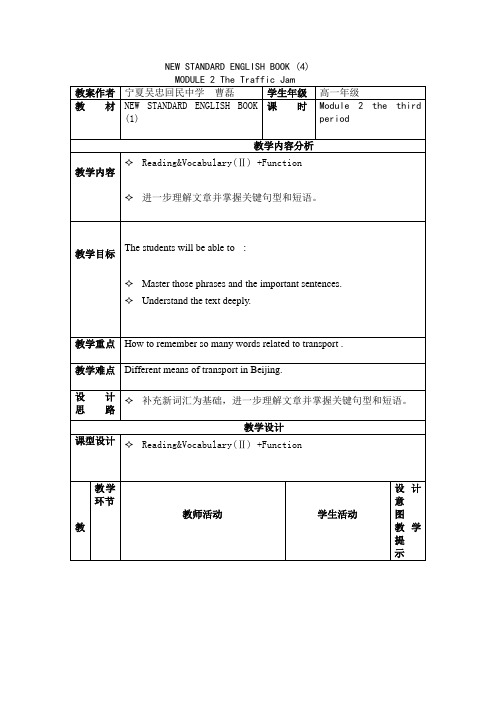
NEW STANDARD ENGLISH BOOK (4)MODULE 2 The Traffic Jam教案作者宁夏吴忠回民中学曹磊学生年级高一年级教材N EW STANDARD ENGLISH BOOK(1) 课时Module 2 the thirdperiod教学内容分析教学内容✧Reading&Vocabulary(Ⅱ) +Function✧进一步理解文章并掌握关键句型和短语。
教学目标The students will be able to :✧Master those phrases and the important sentences.✧Understand the text deeply.教学重点H ow to remember so many words related to transport .教学难点D ifferent means of transport in Beijing.设计思路✧补充新词汇为基础,进一步理解文章并掌握关键句型和短语。
教学设计课型设计✧Reading&Vocabulary(Ⅱ) +Function教教学环节教师活动学生活动设计意图教学提示学流程教学流程导入Step 1✧Check the homeworks in activity3.·show out the words game accordingto those words.·correct the answers together.Step 2 Analyze the textAsk SS to read the text one sentencesby one sentence and then ask anotherSs to translate it into Chinese.·give out the examples of eachphrases.·let’s sum up some words related totransport in the text, make sure youcan understand the meanings of thesewords.·be connected to /with·be/ get stuck in·in no time✧Correct the answerand check it.✧Make notes✧Discussion thisquestions✧Give someinformation✧Students writedown them andmake a report.知识新授·at a time·on time·get/look around·switch off/on·turn on/offStep 3 FunctionAsk the Ss to find more examples inthe text and encourage the students touse these phrases to give advice.Ask Ss to read the sentences inActivity 1 on page 13 and summarizethe ways of giving advice.You should do …Make sure you do …It’s a good idea to do …You had better do …Why not do …?Why do n’t you do …?Let’s do …What about…?How about…?Shall I / we do…?2. Ask Ss to write some advice to theirclassmates about learning English.1. You should work hard at English.2. Why don’t you buy some Englishtapes and some books to go with them3. You had better join in the EnglishCorner and speak English as often aspossible.4. Why not look for a foreign penfriend if you want to improve yourwriting?5. Make sure you listen to English andspeak it every day.Step 4 More PracticesDeal with Ex2 on page 13 in the✧Write down thosephrases andremember it.✧List out thestructure and giveout moreexamples .✧Deal with theexercise carefully.练习巩固Make a dialogue use those phrases. 总结✧板书/课件设计提示MODULE 2 The Traffic JamReading&Vocabulary(Ⅱ) +Function·be connected to /with ·at a time·on time ·get/look around ·switch off/on ·turn on/off ·be/ get stuck in ·in ni time课后作业✧Remember those phrases and dictation tomorrow.✧Preview next part教学反思。
- 1、下载文档前请自行甄别文档内容的完整性,平台不提供额外的编辑、内容补充、找答案等附加服务。
- 2、"仅部分预览"的文档,不可在线预览部分如存在完整性等问题,可反馈申请退款(可完整预览的文档不适用该条件!)。
- 3、如文档侵犯您的权益,请联系客服反馈,我们会尽快为您处理(人工客服工作时间:9:00-18:30)。
16. There are three libraries in our school, _______ were built five years ago. A、all of them 、 B、either of them 、 C、all of which 、 D、both of that 、
C
D 11. This is the same pen ______I lost yesterday. A. as B. that C.the one D. A&B
比较: 比较:
...the same pen as I lost.
表示这支笔与我不见的那支很像, 表示这支笔与我不见的那支很像,不一定就是
重点语法: 重点语法:定语从句
考点八: 考点八:Whose 用法及转换形式
whose引导定语从句 其后应紧跟名词, 引导定语从句, 1. whose引导定语从句,其后应紧跟名词, 构成名词短语。 构成名词短语。 That’s the child whose father is a teacher. 2.whose引导定语从句, 2.whose引导定语从句,其先行词不仅可 引导定语从句 以指人,还可以指物。 以指人,还可以指物。 Do you know the woman whose husband is a doctor? This is a book whose cover is green.
C 3. She will never forget the day_____ she spent in Beijing.
She will never forget the day_____ she A stayed with him in Beijing. A、when 、 C、which 、 B、what 、 D、why 、
D 9. As many members _____ were present agreed to the plan.
A. who C. which B. that D. as
B 10. He must be from Africa, _____ can
be seen from his skin. A. that C. who B. as D. what
ห้องสมุดไป่ตู้
18.Here are players from Japan, some of _________ are our old friends. C
非限制性定语从句
Here are some players from Japan and some of ________ are our old friends. D
4. The college won’t take anyone _____ ’ B eyesight is weak. A、who 、 C、of whom 、 B、whose 、 D、which 、
B 5.Those _____ to take part in the game write down your names. A、who B、who want 、 、
... the same pen that I lost.
则表示这支笔就是我不见的那支 .
12. The teacher gave us so difficult a A problem ___ we couldn't solve. The teacher gave us so difficult a problem ___ we couldn't solve it. B A. as C. which B. that D. the ones
3. whose的先行词指物时 可用 which代替 的先行词指物时, 代替, 的先行词指物时 可用of 代替 但词序不同, 但词序不同, 名词=the +n + of which 即whose+名词 名词 =of which + the + n.
He lives in the room whose window faces south. = He lives in the room, the window of which faces south. = He lives in the room, of which the window faces south.
2. My mom insists that I should do 坚持认为, everything by myself. 坚持认为,坚决要求 Tom insisted that he didn’t steal things 坚持说, from his classmates. 坚持说,固执己见 didn’t The poor boy insisted that he _________ do anything wrong and insisted that he shouldn’t ________be blamed for the thing.
so ...that 后面跟的是一个结果状语从句
13. ______is mentioned above, the B number of the students in senior high school is increasing. A. Which C. What B. As D. That
C、who wants 、 D、what 、
6. I,______ your good friend, will , D try my best to help you out. A、who is 、 C、what am 、 B、what is 、 D、who am 、
B 7. Which of the two cows ______ you keep produces more milk?
14. I’ll tell you _____ he told me ’ D last night. A. all which B. all what C. that all D. all
15. How do you like the book?
It’s quite different from _____ I read ’ C last month. A. that B. which C. the one D. the one what
考点九: 考点九:定语从句中主谓一致问题
1. 定语从句中的动词在人称和数方面应该与它 先行词保持一致 保持一致。 的先行词保持一致。 (1) I am not a person who ______afraid of is
difficulty. .
am (2)Don ’t choose me, who _______not fit for this job. .
2.“one of+可数名词复数” 2. one of+可数名词复数”引导的定语从句
study He is one of the students who ______very hard at school.
“one of+可数名词复数后接定语从句时,从句谓语动词 one of+可数名词复数后接定语从句时, 应用复数 应用复数 He is the/the only one of the students who studies ________very hard at school of+可数名词复数”前有the the或 only修饰 修饰, 而“one of+可数名词复数”前有the或the only修饰, 单数。 定语从句中的谓语动词用单数 定语从句中的谓语动词用单数。
17.I bought some books from the bookstore, five ______were English A novels. A. of which C. that B. which D. in which
名词/代词/数词+of+ 名词/代词/数词+of+ which /whom引导 /whom引导 非限定性定语从句
并列句
A. which C. whom B. that D. them
解题思路: 解题思路
1. 通读全句。首先判断是什么句型。 通读全句。首先判断是什么句型。 2. 题干句如果是疑问句式,将其转化为陈 题干句如果是疑问句式, 述句式。 述句式。 3. 分析从句的句子结构,在定语从句中, 分析从句的句子结构,在定语从句中, 缺什么,就补什么:缺主或宾语, 缺什么,就补什么:缺主或宾语,用关 系代词;缺状语, 系代词;缺状语,用关系副词 4. 注意标点符号和题干中是否存在并列连 词and, but等。 等
Exercises
1. Is this factory ____ we visited last D week?
B Is this the factory ____ we visited last Week? A、where B、that 、 、
C、to which 、 D、the one 、
解题关键:如果是疑问句式, 解题关键:如果是疑问句式,将其转化为陈 述句式。 述句式。
考点十. 考点十.非限制性定语从句和单句的比较
1.I am reading Harry Porter, which an interesting book. _____is This 2.He failed in the exam._______ made his parents angry. which 3.He failed in the exam, _______made his parents angry. × that 4.He has two sons. Both of ________ are teachers. them whom 5.He has two sons, both of ________ are teachers. them 6.He has two sons, and both of _____are teachers.
